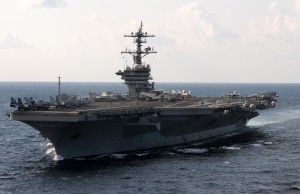ANALYSIS: How do you solve a problem like Iran?

The confrontation over Iran’s nuclear program appears to be heading toward a crescendo—and that’s not the same as a resolution.
To be sure, talk of western or Israeli military action against Iran’s nuclear program has been at a low boil for years, now. In recent weeks, however, the intensity has increased and spiked on Thursday, February 2, when Washington Post columnist David Ignatius wrote:
[U.S. Defense Secretary Leon] Panetta believes there is a strong likelihood that Israel will strike Iran in April, May or June . . . .
That’s this spring. The reason, Ignatius explained, is that Israel believes it must act before Iran moves its work into deep, underground facilities that only the United States could strike. Ignatius goes on to say that:
Israeli Prime Minister Benjamin Netanyahu doesn’t want to leave the fate of Israel dependent on American action which would be triggered by intelligence that Iran is building a bomb, which it hasn’t done yet.
In other words, Israel and the United States have different “red lines.” Israel may strike while Iran’s nuclear facilities are still within reach of weapons in the Israeli arsenal. The United States, which has greater ability to hit deeply buried targets, appears more willing to wait and see if Iran’s policies can be changed through sanctions and diplomatic pressure. This strategic patience from the Obama administration obscures the fact that consistent reporting has indicated the United States would act militarily should it receive intelligence that Iran has made a decision to build a bomb.
David Ignatius—perhaps the best national security columnist working today—isn’t the only source for these latest concerns. Both CBS and NBC on Thursday reported that Panetta refused, when asked, to contradict the account from Ignatius. And only two weeks ago, General Martin Demsey, USA, chairman of the Joint Chiefs of Staff, travelled to Israel to discuss the challenge of Iran’s nuclear program—only to come away conceding that the two close allies see the threat differently.
Speaking to the National Journal one week after his return to Washington, Dempsey said:
We have to acknowledge that they … see that threat differently than we do. It’s existential to them. My intervention with them was not to try to persuade them to my thinking or allow them to persuade me to theirs, but rather to acknowledge the complexity and commit to seeking creative solutions, not simple solutions.
The simple solutions Dempsey referred to are certainly air strikes. Bryan Gold at the American Security Project explains why attacking Iran is a bad idea in a blog post. It boils down to this: bombing won’t change Iran’s strategic intent. It might delay Iran’s acquisition of nuclear weapons, but it won’t stop the program—and it may make the regime and its people more unified in their desire to become a nuclear power.
And here is the rub for policy makers in Washington:
You’ve said an Iranian bomb is “unacceptable.” But you disagree with your closest regional ally’s sense of urgency. How do you navigate the shoals between maintaining international pressure, on the one hand, and not inflaming passions, on the other, which may make a peaceful resolution impossible?
All of this is rather academic and detached from the comfort of Newport. But if you are the Prime Minister of Israel, or the President of the United States, you’re facing real responsibility to protect your nation and its citizens.
Different leaders will conclude different things, and that appears to be exactly what’s worrying policy makers in Washington today.
PROGRAMMING NOTE:
On Wednesday, April 11, the Pell Center Lecture Series will focus on Iran’s nuclear program with Dr. David Albright, President of the Institute for Science and International Security in Washington, DC. Check back for more details when they become available.
Your turn: What should the U.S. policy be regarding Iran’s nuclear program?
